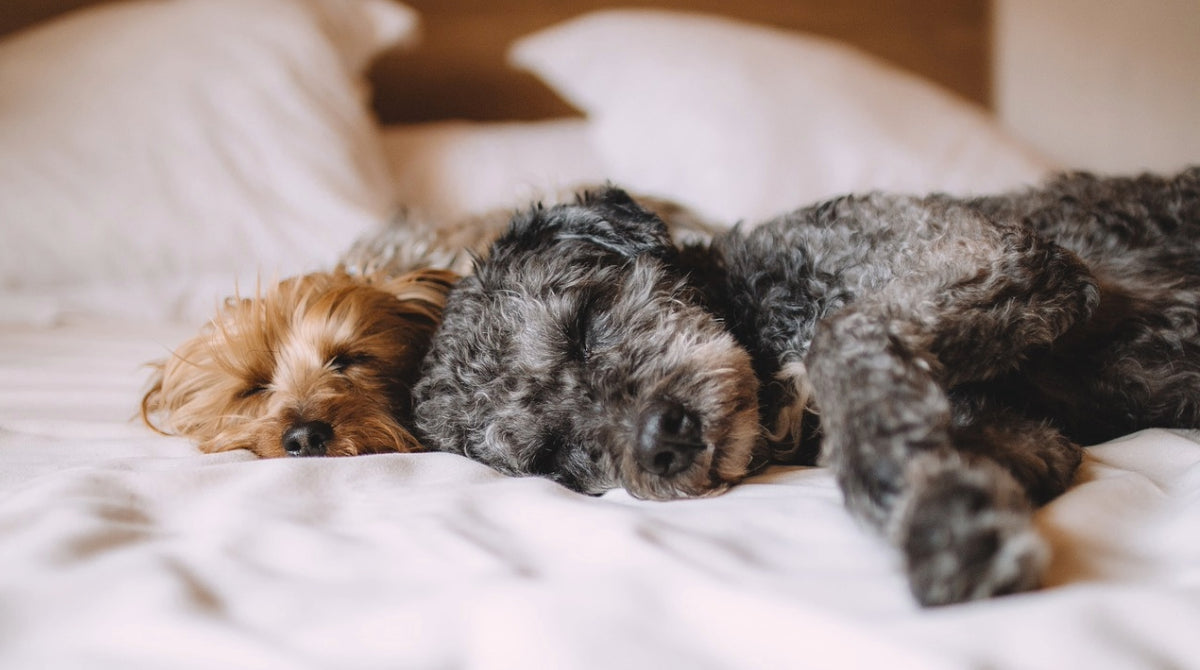
My dog snores
"The greatest gift is a sleeping dog – unless he snores like a lumberjack."
Who among us hasn't experienced this? You're lying in bed at night, trying to relax, and suddenly you hear an unmistakable sound next to you: your partner is snoring! While some find this noise cute or even soothing, for others it can cause sleepless nights. Even worse when your dog snores too! A phenomenon that Martin Rütter humorously explores in his video.
But why does this happen to dogs, and what can you do about it? Let's delve into the world of animal snoring together.
Why do dogs snore?
Snoring is caused by a blockage or narrowing of the airways. In dogs, there are several reasons why this can happen:
- Anatomy: Dogs with short snouts, such as pugs and bulldogs, often have narrow nasal passages and an elongated soft palate due to their breeding. This makes them prone to snoring.
- Obesity: Extra weight can also put strain on the respiratory system. Fatty tissue around the neck and chest can impair breathing.
- Allergies: Pollen, dust, or other irritants can cause your dog's airways to swell.
- Sleeping position: Sometimes it is simply a particularly relaxed position that partially blocks the airways.
- Health problems: Polyps, infections or even serious illnesses such as tracheal collapse can be behind snoring.
Is your dog's snoring dangerous?
Not all snoring is cause for concern. However, there are signs that suggest you should have the problem examined more closely:
- Irregular snoring: Does snoring occur suddenly without your dog having snored before?
- Other symptoms: Does your dog have difficulty breathing, cough often, or seem exhausted?
- Heavy breathing: Do you hear a whistling or hissing sound while breathing?
If you're unsure, a visit to your veterinarian is recommended. They can determine whether treatment is necessary.
Tips and tricks: What to do if your dog snores?
- Weight control: If your dog is overweight, even a slight weight loss can work wonders. A healthy diet and regular exercise are key.
- Optimize your sleeping area: Provide a comfortable dog bed. Some dogs snore less when they sleep slightly elevated or on their side.
- Improve air quality: Use a humidifier or keep the sleeping area free of dust. Fresh air helps your dog breathe better.
- Treating Allergies: If your dog suffers from allergies, talk to your veterinarian about appropriate treatments.
- Surgery for anatomical problems: In severe cases, surgery may be necessary to widen the airways. This particularly affects short-nosed breeds.
- Keep calm: If your dog only snores occasionally and is otherwise healthy, there's no need to worry. Instead, enjoy the gentle "sawing" of your canine companion.
Exciting facts about snoring
Remember the following for your next team dinner or pub quiz:
- Not only dogs snore: cats, horses and even dolphins can snore too!
- Short-nosed breeds snore more often: But Labradors and dachshunds can also become snorers.
- Pure relaxation: Some dogs only snore when they are sleeping particularly deeply and relaxed.
Conclusion
A snoring dog can be both annoying and endearing. Often, it's due to harmless reasons, such as sleeping position or a slight constriction of the airway. In some cases, however, it can indicate health problems. With a few simple measures, you can help your dog and yourself have a more restful night. However, if snoring occurs suddenly or is accompanied by other symptoms, don't hesitate to consult a veterinarian.
At the end of the day, a snoring dog may be loud—but it also shows you how comfortable it is with you. And that's the most important thing, right?
Share

